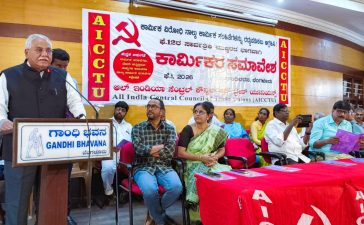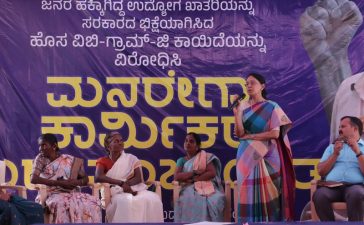Will the 4% Muslim Quota in Public Contracts Withstand Legal Scrutiny?
Bengaluru, March 21, 2025 – In a significant legislative move, the Karnataka Legislative Assembly passed the Karnataka Transparency in Public Procurement (Amendment) Bill, granting a 4% reservation to Muslims in public contracts. The decision, aimed at promoting inclusivity, has sparked intense political debates and confrontations within the Assembly.
Key Provisions of the Amendment
The newly passed bill reserves 4% of civil works contracts up to ₹2 crore and goods and services contracts up to ₹1 crore for contractors from Other Backward Classes (OBC) Muslim communities. This amendment extends the existing reservation framework, which already allocates 24.1% for Scheduled Castes and Scheduled Tribes (SC/ST) and 19% for other OBC categories in public procurement.
Assembly Proceedings Marred by Protests
The bill’s passage was marked by significant unrest. Opposition legislators vehemently protested, alleging procedural lapses and constitutional violations. The situation escalated when 18 opposition MLAs were suspended for disrupting proceedings, leading to their forcible removal from the Assembly. Speaker U T Khader’s directive to marshal out the protesting members underscored the session’s intensity.
Government’s Justification
Chief Minister Siddaramaiah defended the amendment, asserting that it aims to ensure equitable participation of marginalized communities in public procurement. He emphasized that the 4% reservation for Muslims under the 2B category of OBCs aligns with the state’s commitment to social justice and inclusivity.
Opposition’s Stance
The opposition has criticized the bill as unconstitutional and accused the government of pandering to specific communities for electoral gains. Leaders have vowed to challenge the legislation, arguing that it could set a precedent for religion-based reservations, which they believe contradicts the secular fabric of the nation.
Societal Implications and Debates
The bill has ignited discussions on affirmative action and the criteria for reservations. Proponents argue that the legislation addresses historical injustices faced by the Muslim community in Karnataka, promoting their socio-economic upliftment. Critics, however, contend that reservations should be based solely on socio-economic status rather than religious identity, cautioning against potential communal polarization.
Future Outlook
As the bill awaits the Governor’s assent to become law, its implementation may face legal challenges from opposition parties and civil society groups. The unfolding scenario will test Karnataka’s political dynamics and the broader discourse on affirmative action in India.
Conclusion
The Karnataka Assembly’s approval of the 4% reservation for Muslims in public contracts marks a pivotal moment in the state’s legislative history. While the government hails it as a progressive step towards inclusivity, the ensuing political and legal battles underscore the complexities inherent in policy decisions affecting diverse communities.
Key Quotes
📌 Chief Minister Siddaramaiah: “This amendment ensures fair opportunities for backward communities, including OBC Muslims, in public contracts. It is a step toward economic empowerment.”
📌 Opposition Leader: “This move is unconstitutional and politically motivated. We will challenge it legally and ensure merit prevails.”
📌 Analysis: “The bill highlights the ongoing debate on affirmative action—should reservations be based on caste, religion, or economic status?”
Q & A
🔹 Q: What does the Karnataka Transparency in Public Procurement (Amendment) Bill propose?
🔹 A: It reserves 4% of public works contracts for OBC Muslims in Karnataka.
🔹 Q: Why is the bill controversial?
🔹 A: Critics argue that it sets a precedent for religion-based reservations, while supporters say it ensures social justice.
🔹 Q: How has the opposition reacted?
🔹 A: They have protested, calling it unconstitutional and vowing legal action.
🔹 Q: Will the bill be implemented immediately?
🔹 A: It awaits the Governor’s assent and may face legal challenges.
Context & Background
The Karnataka government has historically implemented reservation policies for marginalized communities, but religion-based quotas have been a point of contention. In 2023, the BJP-led government scrapped the 4% OBC Muslim reservation in education and jobs, redistributing it to Vokkaligas and Lingayats. Now, with a change in leadership, the Congress-led government is restoring and expanding quotas in public procurement, further fueling the debate on affirmative action.
#KarnatakaBandh #ReservationDebate #MuslimQuota #PublicContracts #SocialJustice #AffirmativeAction #KarnatakaPolitics #OBCReservation #CongressVsBJP
![]()











